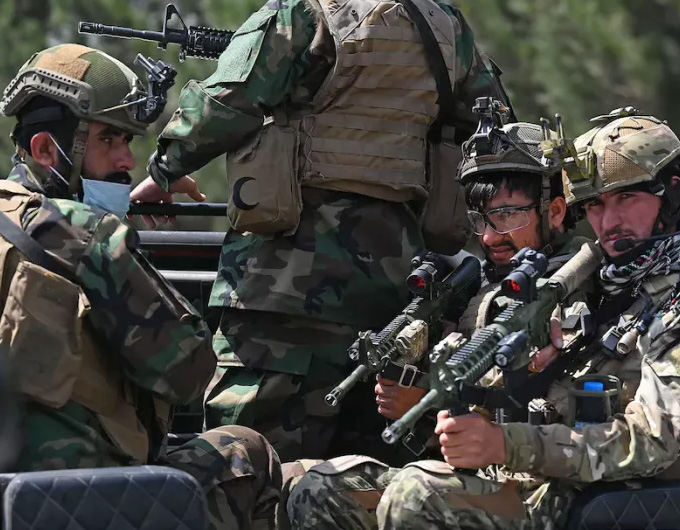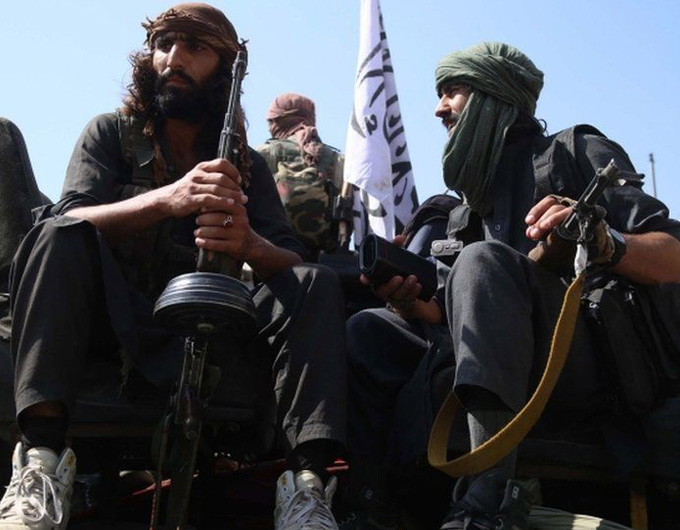
Gues OpEd by Katarzyna Rybarczyk
More than 170 Afghan civilians and 13 US service members died in a devastating suicide bombing attack at Kabul’s airport last month.
The group known as ISIS-K claimed responsibility for the blasts, which left the world wondering if ISIS could rise again.
ISIS-K stands for the Islamic State Khorasan. The term Khorasan was historically used to describe the region that includes present-day Afghanistan, as well as parts of the Middle East and Central Asia.
The group, which emerged in 2015, is an official ISIS affiliate operating in Afghanistan and Pakistan.
(Shepard Smith joins Closing Bell on the ground in Kabul following 11 Marines and one Navy medic being killed in the attacks on the Kabul airport. Courtesy of CNBC Television and YouTube. Posted on Aug 26, 2021)
The organization was founded by former members of the Taliban and the two groups became enemies right after ISIS-K’s emergence.
The ideology of ISIS-K is said to be more radical than the one of the Taliban, and the group is known for violent attacks on civilian targets.
For instance, in May 2021, its militants exploded a bomb near a girls’ school in west Kabul, killing at least 90 and injuring hundreds.
A year before that, the organization’s gunmen entered the maternity ward in the city and killed 24 people, including newborn babies and mothers.
(US President Joe Biden has vowed to hunt down the group responsible for the suicide bomb attacks at Kabul Airport. Courtesy of ABC News (Australia) and YouTube. Posted on Aug 27, 2021.)
Over the years of fighting the Islamic State, the Afghan security forces managed to decimate ISIS-K. The major operation that weakened the group took place in 2017.
Then, the US dropped the ‘mother of all bombs’ on ISIS-K’s tunnel complex. After the strike, designed to maximize the destruction of ISIS-K facilities, many believed that ISIS-K had been defeated.
Recent events show, however, that the group might have been asleep, but it certainly has not stopped operating.
The Kabul airport attack was a reminder to the US and the world that ISIS is still active and able to spread chaos and fear. Still, ‘ISIS-K’s bombing on August 26 was not just an attack on US forces’, the Conversation observed.
It was also an attempt to discredit the Taliban, to undermine their authority and ability to provide security for Afghanistan.
(As the Taliban controls Afghanistan, following the withdrawal of western troops, what threat do other militant groups Al-Qaeda and ISIS-K pose in the country? Courtesy of Forces News and YouTube. Posted on Sep 1, 2021.)
ISIS-K has shown that they are ready to resurge and challenge the Taliban as they are forming a government.
With that in mind, more violence from ISIS-K can be anticipated and those who will bear the consequences are the innocent.
That has already proven true as, in response to the Kabul airport terrorist attack, the US launched two drone airstrikes against ISIS-K.
Subsequently, ten civilians, including seven children, were killed.
As more violence on the part of ISIS-K follows, further US strikes will happen and the Taliban are also expected to react using disproportionate force.

The situation in Afghanistan is already extremely dangerous and US commanders believe that more ISIS-K attacks will happen in the next few days.
In recent weeks ‘ISIS-K has strengthened its positions in and around Kabul and expanded its presence to several provinces’ revealed a UN report. Now, the group is becoming a major threat to the Afghan people and many wonder if the West is at risk too.
In principle, ISIS-K’s objectives and tactics are similar to those of ISIS’ core leadership in Iraq and Syria. The group wants to establish a global caliphate and uses terror to threaten people into submission.
For the time being, however, its focus is to turn Afghanistan into a base for planning its attacks and then expand the caliphate to Central and South Asia.
That said, at present ISIS-K does not pose an immediate threat to the US and the West. Still, that does not mean that the international community can breathe a sigh of relief.
Everything can change in the near future if the Taliban do not effectively counter ISIS-K.
Indeed, their ability to do it is questionable as the suicide bomber who carried out the airport attack had managed to pass through Taliban checkpoints.
Even though at present ISIS-K mainly operates underground, the group is becoming increasingly dangerous and the imminent fight between them and the Taliban is likely to be very lethal.
(President Joe Biden delivered remarks following the attack on American service members outside the airport in Kabul, Afghanistan. Courtesy of CNBC and YouTube. Posted on Aug 26, 2021.)
If ISIS-K continues to regain strength and thrive, the US involvement might be necessary again as Joe Biden vowed to hunt the people involved in the attack down, and make ISIS-K pay for the Kabul airport attack.
That raises the question of whether another war on terrorism between the US and ISIS is about to start.
About the author

Katarzyna Rybarczyk is a Political Correspondent for Immigration Advice Service, an immigration law firm based in the UK but operating globally.
Through her articles, she aims to raise awareness about security threats worldwide and the challenges facing communities living in low and middle-income countries.
AST strives to meet a 3 STAR trustworthiness rating, based on the following criteria:
- Provides named sources
- Reported by more than one notable outlet
- Includes supporting video, direct statements, or photos
















